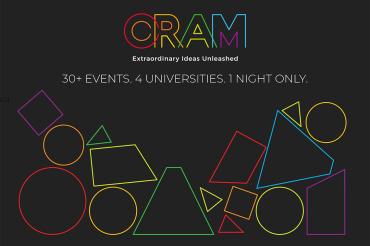CRAM festival connects leading U of T researchers and public

Published: March 27, 2019
A new, free festival of ideas will connect Toronto universities with their communities on some of the most pressing local and global challenges, from homelessness to climate change.
CRAM, which takes place across the city the evening of April 5, features University of Toronto faculty members who will share their work on everything from artificial intelligence, fast radio bursts and the origin of the universe, to how math and statistics help us understand luck.
"We're proud to open our doors and give the public a look into how our researchers, using a range of multidisciplinary approaches, are coming together to find innovative solutions to the complex challenges we face in Toronto and globally," says Vivek Goel, U of T's vice-president of research and innovation.
The festival’s organizer Mary Ito, a broadcast journalist for over 30 years, envisions the festival as TED Talks-meets-Nuit Blanche.
Ito, who studied English at U of T and cut her teeth in journalism at The Varsity, has often interviewed researchers about their work over her career in radio and television at CFRB, CBC, CFTO-TV, Global TV and TVO. The idea for CRAM came to her after talking to a friend of hers, a professor in the U.S., about a one-night festival overseas. After hanging up, Ito thought to herself: “Why can't we have a festival on all aspects of life, involving not just one university but all of our universities working together?”
The festival brings together the broader Toronto community with university researchers to showcase their groundbreaking work – and to hightlight the important role Toronto's universities play in their surrounding neighbourhoods, developing new ideas and addressing contemporary challenges.
“I hope it will open up people’s minds to startling new ideas and revolutionary concepts that are either changing our lives today or possibly will in the future,” Ito says. “It will make us think in different ways about the possibilities of what can happen in our lives.”
Andrea Most, a professor in the department of English affiliated with the School of the Environment, welcomes the chance to speak to a wider audience. “At U of T, we’re in the middle of the city but we don’t always have opportunities for this kind of outreach,” she says.
Read more about Most in U of T News
The theme of her talk is what the humanities can contribute to the fight against climate change. “The old story of western culture is that we are disconnected from nature,” she says, “so my goal is to help my students reconnect to the idea that they are nature.” By telling new stories about people’s place in the world, the humanities can bring about a cultural shift that inspires more respect for the planet, she adds.
“Just because you’re not a so-called activist or politician or scientist doesn’t mean you don’t have the ability to help shift the conversation in major ways,” she says. “We have such a big problem, we need all hands on deck.”
Dr. Stephen Hwang, a general internist at St. Michael’s Hospital and professor in U of T’s Faculty of Medicine, is focusing on another seemingly intractable problem: homelessness.

Professor Stephen Hwang will give a talk at the CRAM Festival titled “From the Streets to Solutions: Tackling Homelessness” (photo by Rob Waymen)
Hwang researches how to improve the health of people who are homeless or unsafely housed, and how to curb or end homelessness. He spends a half day a week treating patients at Seaton House, the largest men’s shelter in the country located in Toronto. There, he and a medical team treat conditions ranging from skin infections and breathing problems to mental illnesses.
Hwang was a lead investigator in the Mental Health Commission of Canada's “At Home” study, which measured the effectiveness of homelessness interventions among 2,000 people living with mental illness over two years. The results suggest a housing-first strategy, in which people are given immediate access to permanent housing, was much more effective at reducing homelessness than the usual treatments.
“I don’t just want to convey the science of what I do but to inspire people to care,” he says. “There is interesting science to be done, but like many problems in our society homelessness persists not because we have no idea how to solve it.”
Ito hopes the festival will not only open people's eyes to current research, but also ignite their curiosity. “It would be great if they came to see what's going on and it excited them about the other possibilities of learning in their lives,” she says.
See the full CRAM schedule



